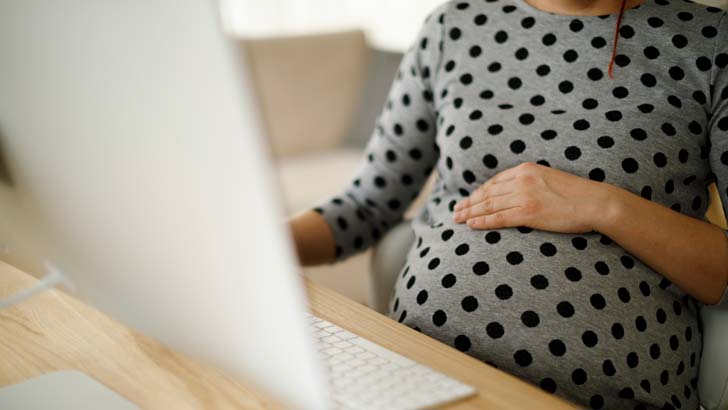How to manage your money while on maternity leave
By Michelle Ives
Bringing new life into the world is an exciting time for any mum, let alone a novice, and it comes rife with an unfamiliar set of financial considerations.
For those worried about managing expenses on a single income, or solely on government benefits, you aren't alone.
The stress can suck the joy out of one of the most important periods of your life - but it's not all newborn tears. By strategically preparing your cash flow and expenditure, and having a "visibility plan" for keeping your foot in the income door, you'll make sure the only deprivation on your doorstep is sleep-related.
My husband and I cannot wait to welcome our newest addition to the family. As a small business owner, here's what we're doing to get our finances ready.
Live on a single income now
For the last six months, since we found out we were pregnant, we've been living on a single income. This was, in part, due to severe pregnancy sickness - but it doubled as an opportunity to see how we would fare with whittled down wages.
When I started earning again, we just kept going as it was great practice for what the real thing would feel like. It became a good way to see what kind of expenses we could do to get rid of, as well as ensure we weren't completely shell-shocked with our limiting lifestyle costs when the baby came.
Save a baby buffer ahead of time
All of that secondary income we weren't spending has gone straight into our dedicated baby fund.
This will provide a buffer of income for extra costs we haven't anticipated (like if we need specialist appointments), and will also allow me to take extra time off when any maternity entitlements end.
The amount in the fund depends on what you know of your baby (have you been told they might need extra medical or allied health services after birth?), and the type of maternity experience you want to have (are you going to want to be enrolled in everything, or are you content with local, free meetups and classes?).
I'm more the latter, but I also know I'd like to have flexibility around when I go back to work. So, we're working to have anywhere from $15k to $20k in baby cash by November.
Budget any maternity leave entitlements
I might not have control over many aspects of being a parent, but one thing I've taken a lot of interest in controlling is how much income will be hitting my bank account each fortnight.
As a small business, I won't get any paid employer maternity leave, but I am entitled to 18-weeks Parental Leave Pay from the government.
This is currently $740.60 per week before tax (yes, it is taxable income) and I am creating a budget well ahead of time for how that money will be divided.
Given it's significantly less than I'm used to playing with, I'm using a lean budget methodology, but my priorities are our mortgage, household costs (like bills, fuel and insurance premiums), and perhaps most importantly, concessional superannuation contributions.
You may have a mix of paid employer leave and PLP, which is great - that will give you more time and ensure a job is waiting for you at the end of it.
If not, you could still be eligible for the lump-sum Newborn Upfront Payment and Newborn Supplement (with family tax benefits), or the Parenting Payment for main carers.

Keep superannuation funds healthy
It's no secret that women suffer the most when it comes to losing out on valuable super - on average, we retire with up to 47% less than men. Just because I'm taking time out of the workforce, I don't plan on this being the case.
I will continue to make superannuation contributions a priority with my maternity leave payments and baby fund cash, and my husband and I are also planning for him to split some of his contributions into my superfund at the end of this financial year.
Not all funds offer contributions splitting, but it can be a good way to keep both topped up and compounding if they do. However, be wary of fund recovery fees for doing this.
Keep skills strong
For anyone self-employed out there, they know how important it is to keep a professional presence alive. Once my maternity entitlements end (and even though I may choose to extend my leave), I will continue to network and prospect where I can.
If that means handing the sprog to my husband when he gets home from work so I can attend evening events, that's what I'll do. My goal is to work a few hours each week to keep the income wheels slowly turning, and my business in front of clients.
It might only be a minor addition to our household income but the main driver isn't earnings. It's to ensure I'm keeping doors open and my skills polished, which I know will put me in great stead when I'm ready to ramp things up again.
Some other money-savvy things we're doing:
Given the real power of compound interest lies in time, we've decided to invest in our child's name (with them as trustee) until they are 18, at which point we'll transfer the portfolio as a gift.
According to ASIC's compound interest calculator, an initial deposit of $1000, with monthly contributions of $150 could turn into almost $65k at an average return of 7%.
That's a deposit on their first place, or the ability to cash flow their higher education. Start early, add regularly - you have time on your side.
We've set reminders to add our newest addition to our health and life insurance policies immediately after birth - we'll probably be knocked for six with exhaustion and won't remember otherwise.
We've been told by countless people not to buy too much stuff, especially as we don't know what we'll need yet (or what the baby will even take to). So, we've kept the list very short, and most of it we're finding secondhand.
We're trying to get as prepared as we can to save on convenience costs when the baby arrives. We'll batch-cook weeks' worth of nutritious meals that can be whipped up quickly and stockpile things we know we'll need in a hurry. Apparently this is a life-saver for finances.
Get stories like this in our newsletters.



